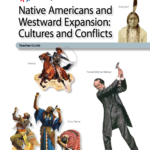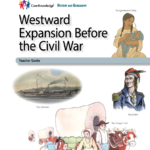Reservation Controversies covers historic issues dealing with American Indian Reservations in the 1870s. This experience uses problem based learning (PBL), in which the student is confronted or faced with a real world problem which has no preconceived right or wrong answers. This scenario puts the student as prospective Indian Agent for the Comanche Indian reservation in 1873. Using various teaching/learning strategies, which include brainstorming, role playing, and oral presentations, the students access primary sources and other background sources to arrive at a recommendation, based on the information. The teacher, librarian, and other support staff act as guides or advisors through most of the process.
Documents and Debates in American History and Government – Vol. 1, 1493-1865
The Core Documents Collection – Documents and Debates is structured around a series of topics, each based on a question for debate. For each topic, there is a collection of documents that, together, form the basis of argument over that topic – from those who debated it at a given point in American history. Volume One covers 1493-1865, and Volume Two covers 1865-2009.
The goal is to explore a series of critical moments in American history by asking questions for which there are not simple yes/no answers, but instead call for informed discussion and rational debate. The Documents and Debates readers also include appendices of additional documents, and together are a perfect fit for any American History survey course, including AP U.S. History.
NHD Breaking Barriers: Americans and Native Americans
From the colonial era, relations between European settlers and Native American nations have been complicated. In 1803 Congress authorized and funded an expedition led by Meriwether Lewis and William Clark for exploration of the region and for better knowledge about American Indians of the Northwest in order to develop trade. About 30 years later, the United States forced the removal of Native Americans from their lands to make way for white American settlement. Congress and the president made treaties with Native American nations, but those treaties were not always respected as the United States continued to expand into the west. After Native Americans enlisted and served in both World War I and World War II, Congress passed legislation to begin to address longstanding Native Americans claims against the United States Government.
Native Americans: Cultures and Conflicts (CKHG Unit)

Across 7 lessons, this unit explores the ways of life of diverse Native American peoples and how their cultures were disrupted, displaced, and profoundly altered by westward expansion and American government policies and practices in the 1800s. Some of the content of this unit is tied to the “Pathway to Citizenship,” an array of civics-focused knowledge, questions, and activities.
Westward Expansion Before the Civil War (CKHG Unit)

The unit explores the westward movement of Americans in the nineteenth century: the early explorers, effects of new developments in transportation, Native American resistance to settlers, and the treaties broken by government officials. Across 10 lessons, students explore the use of Manifest Destiny to promote the acquisition of US territory, the annexation of Texas, the Oregon Trail, and the California gold rush.